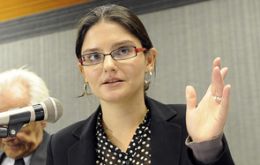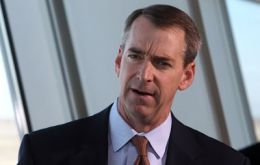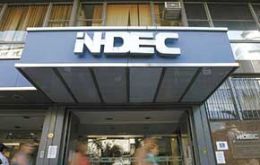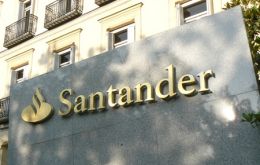MercoPress. South Atlantic News Agency
Economy
-
Friday, February 3rd 2012 - 17:56 UTC
Brazilian minister travels to Argentina to discuss latest set of import obstacles

Brazilian Secretary of Foreign Trade Tatiana Prazeres will be travelling to Buenos Aires next Monday to address with Argentine counterparts the extent of the last set of measures implemented by the administration of President Cristina Fernandez to slow down the flow of imports.
-
Thursday, February 2nd 2012 - 22:54 UTC
CFK warns corporations have “made a lot of money”: don’t forget workers’ share

Argentine President Cristina Fernández ruled out that the Government is planning to set a ceiling on this year’s collective bargaining and said that unions must “carry on with their salary negotiations freely by taking corporate profit into account.” She announced, however, the creation of a committee in order to follow them closely.
-
Thursday, February 2nd 2012 - 05:47 UTC
Brazil will evaluate the impact and legality of Argentina’s latest trade barriers

The Brazilian government expressed concerns over the new Argentine trade barriers going in effect on Wednesday and informed that it would “evaluate its impact and legality” before making any decisions, Foreign Trade secretary Tatiana Prazeres announced.
-
Thursday, February 2nd 2012 - 05:36 UTC
Obama administration unveils “Buffett rule” to tax all millionaires a minimum 30%

The US administration of President Barack Obama formally unveiled on Wednesday the “Buffett rule”, legislation to ensure that all millionaires would pay a minimum federal tax of 30%.
-
Thursday, February 2nd 2012 - 05:31 UTC
American Airlines presents union plan to cut costs and 13.000 layoffs

American Airlines said on Wednesday it needed to cut costs by 20% to stay afloat, as it met with union representatives to detail a plan for layoffs that reports said would total 13,000 workers.
-
Thursday, February 2nd 2012 - 05:15 UTC
IMF warn Argentina on ‘lack of progress’ in addressing inflation data

The International Monetary Fund (IMF) warned Argentina about its “lack of progress” in addressing inflation data and called on the country to implement “specific measures” within the next six months to improve it.
-
Thursday, February 2nd 2012 - 05:10 UTC
Europe’s largest bank profits boosted by its operations in Latin America

Spain’s Banco Santander said that 2011 net profits reveal the growing importance of its Latin America operations which contributed with 51% of the bulk. Last year net profits totalled 5.4 billion Euros, down from 8.2 billion Euros in 2010.
-
Wednesday, February 1st 2012 - 17:32 UTC
Brazilian beef exports declined 14% in 2011 to 820.239 tons

Brazilian beef exports declined 14% in 2011, to 820.239 tonnes swt, establishing it as the world’s third largest beef exporter behind Australia and the US (Global Trade Atlas).
-
Wednesday, February 1st 2012 - 16:08 UTC
Argentina new imports’ restrictions come into effect; claims from Mercosur

Argentina’s controversial new import restrictions came into effect on Wednesday as part of the legislation on the trading sector which gives the government bureaucracy more powers to control and restrict imports.
-
Wednesday, February 1st 2012 - 07:48 UTC
Paraguayan beef exports forecasted to plummet 30% because of FMD outbreaks

The value of Paraguayan beef exports could drop 30% in 2012 compared to the previous year given the loss of markets following two outbreaks of Foot and Mouth Disease, FMD, points out the country’ Centre for Analysis of the Paraguayan Economy, CADEP.
